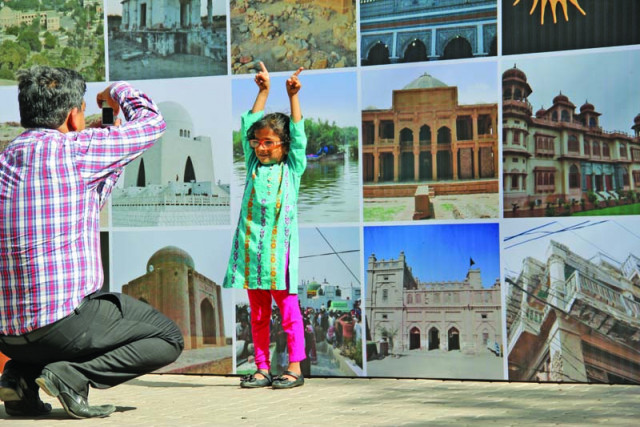Sindh lost and (being) found
Language, society, culture and lack of progress in spotlight on first day of Sindh Literature Festival

Amid merriment and music, literati rued the loss of culture, the dominance of mafia, ignorance towards regional languages, and the lack of progress, as they yearned for the Sindh that once was on the opening night of the fourth Sindh Literature Festival on Friday.
The three-day event that is being held after a year’s gap at the Arts Council of Pakistan (ACP), Karachi, attracted people of all ages from across the province and all walks of life.
With Covid-19 restrictions in place, the first day of the festival featured a panel discussion, a theatre performance for children, and musical performances. Sindh Culture Minister Syed Sardar Ali Shah, in his address, called for change. He said “cultural activism”, which was introduced in Sindh in the past few years, dominated the discourse and that he now wanted to hear something new.
The minister also criticised the federal government for not recognising regional languages as national languages. “They don’t want our languages,” he decried, as he went on to say that the Centre had also taken away the possession of the National Museum from the province.
According to the minister, the employees of the museum have not been paid their salaries. When it was his turn to speak, Karachi-based academic and scholar Professor Syed Jaffar Ahmed, struck a nostalgic note.
“Once there used to be theatres, cinemas, bookshops and much else in Karachi. All of that has disappeared [slowly],” he lamented. “There were playgrounds that have been occupied through China cutting.” He further pointed out that metropolis’ real issues remained unaddressed and that the state had not resolved them yet.
“Today, the major cities of Sindh, including Karachi, are under the influence of mafias,” he said. “And despite boasting a rich history spanning thousands of years, Sindh has not progressed in the right direction.”
Renowned poet Imdad Hussaini again steered the discourse back to regional languages, reiterating the grievance that the state had not recognized them. “But there is no threat from one language to the other. We all love languages and these small issues can easily be resolved,” he added.
Along similar lines, ACP president Muhammad Ahmed Shah said, “We believe in having a pluralistic and inclusive society,” adding that one had to adopt the culture of the place he or she lived in. A Review of Sindhi Society During the panel discussion titled ‘Sindhi Samaj Jo Ibhyas’ (A Review of Sindh Society), human rights activist Naseer Memon said, “The state has deliberately strengthened the feudal class since the partition.” “The exploitative class has been given space, which is not in favour of the common man,” he added.
Linking societal transformation to industrial growth, he highlighted the industries in Sindh were concentrated in Karachi. “The metropolis is home to 65 percent industrial units of Sindh, while Hyderabad houses just five percent units and the remaining 30 percent are dispersed in other regions of the province,” he said, adding that “Societies cannot grow and transform with industrial growth.”
He also raised the issue of dacoits in rural areas and target killers in cities, which, he said, had hit Sindh badly. Renowned writer and scholar Jami Chandio felt the loss of the Sindhi middle class. “They migrated to India soon after the birth of Pakistan and it took years to replace them. But I can see that the [middle] class is emerging now,” he said. He and author Noorul Huda Shah also shed light on different issues of Sindhi society and found hope in the change they could see taking place.
Besides, former MPA Mahtab Akbar Rashdi expressed confidence in women's abilities, saying that the women of Sindh were very active and “today’s women, when given an opportunity, prove themselves.”
Activist and author Amar Sindhu highlighted the role of students and teachers from Sindh in political struggles and criticised the role of the Higher Education Commission with regards to universities.
Today (Saturday) and tomorrow (Sunday), the festival will feature 26 more sessions, book launches and musical and theatre performances. Additionally, for avid readers and bibliophiles, bookstalls have been set up.



















COMMENTS
Comments are moderated and generally will be posted if they are on-topic and not abusive.
For more information, please see our Comments FAQ